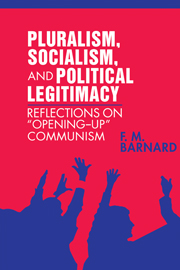Book contents
- Frontmatter
- Contents
- Preface
- 1 Introduction
- 2 The Context
- 3 Socialist pluralism and pluralist socialism
- 4 Ideological differentiation under socialism
- 5 Socialism and the language of sentiment
- 6 Socialism and the language of rationality
- 7 Socialism, politics, and citizenship
- 8 Conclusion
- Appendix: Electoral confrontation under socialism
- Index
Appendix: Electoral confrontation under socialism
Published online by Cambridge University Press: 25 January 2010
- Frontmatter
- Contents
- Preface
- 1 Introduction
- 2 The Context
- 3 Socialist pluralism and pluralist socialism
- 4 Ideological differentiation under socialism
- 5 Socialism and the language of sentiment
- 6 Socialism and the language of rationality
- 7 Socialism, politics, and citizenship
- 8 Conclusion
- Appendix: Electoral confrontation under socialism
- Index
Summary
The translation below covers substantial parts of Chapter 9 in Vladimir Klokočka's Volby v pluralitních democracyích [Elections in pluralist democracies], published in Prague shortly after the Soviet intervention in Czechoslovakia in 1968. It enjoyed only a brief and limited circulation, having been withdrawn from the bookstores not long after publication. It presents a penetrating and detailed reappraisal of socialist statehood, socialist citizenship, and socialist democracy and attempts a highly original approach to pluralism under socialism.
Its author, a political jurist, was at the time a leading member of the Commission for Electoral and Political Reform instituted by the Thirteenth Congress of the Communist party of Czechoslovakia in 1966. After the collapse of the Dubček era of reform, Dr. Klokočka accepted an appointment with the Institute for Political Science, Technical University of Munich. An extended version of Volby is to be republished in Czechoslovakia, and in 1988 Dr. Klokočka published an important article on the chances and risks of Gorbachev's perestroika in Unruhe ist die erste Bürgerpflicht, ed. I. Hanke and H. Keidel (Baden–Baden: Nomos, 1988), pp. 207–23. Dr. Klokočka kindly agreed to the publication of this translation, which is my own. An earlier version appeared, with an introduction and commentary, in Kosmas, Journal of Czechoslovak and Central European Studies, in three parts, 1982–3.
Elections in the contemporary world
The possibility of a peaceful and parliamentary transition to socialism is to be expected in developed industrial countries of the capitalist West in which strong democratic traditions prevail together with institutional checks on political power.
- Type
- Chapter
- Information
- Pluralism, Socialism, and Political LegitimacyReflections on Opening up Communism, pp. 153 - 184Publisher: Cambridge University PressPrint publication year: 1992



